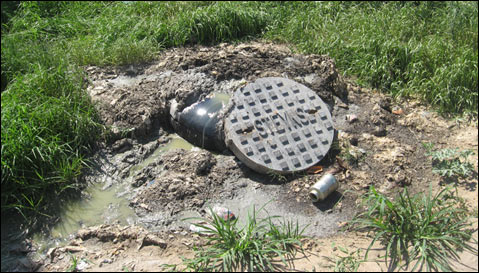
The Sunday Mail

 Lincoln Towindo and Charlotte Musarurwa
Lincoln Towindo and Charlotte Musarurwa
raw sewage — flowing through an old and leaking pipe network — is said to be contaminating the country’s drinking water sources and distribution systems, putting millions of consumers at risk.
Preliminary findings of research work by a local team of senior water management experts show that tap water most likely contains metal particles as well as coliform bacteria commonly found in human and animal waste.
The study, whose comprehensive findings will be publicised soon, also reveals that only Harare, Bulawayo, Gweru and Mutare have water testing laboratories, meaning the rest of the country cannot readily determine water quality after treatment.
It also emerged that the country’s water-testing methods do not conform to acceptable standards, which include stratified and rigorous assessments.
According to the research, sewer systems in most towns and cities are now beyond their lifespan, making them prone to leaks and bursts.
Resultantly, huge volumes of sewage of a ballooning urban population end up contaminating water sources through seepage into the water table and directly.
It is understood only up to 20 percent of waste makes it to sewage treatment plants for disposal. The remainder finds its way to major water sources.
President Mugabe, speaking at the Zimbabwe International Trade Fair last month, revealed that experts determined that not all cities have clean water.
A Cabinet committee has already been set up to address the problem.
One of the researchers, who preferred anonymity for professional reasons, said contamination and unsophisticated testing methods were compromising tap water quality.
The researcher said modern water purification options should replace the ineffective chlorination method presently being used.
“Tap water around the country is not safe. We have established that between 10 to 20 percent of raw sewage is being treated at sewage treatment plants while the rest is leaking into our water sources. The problem is emanating from the seriously compromised and old pipes, which are leaking sewage into the water distribution system.
“Despite this problem, water is not being tested according to acceptable standards, posing a huge risk to consumers. Ideally, water should be tested firstly at the treatment plant then at an intermediary point, usually at water reservoirs.
“Finally, it should go through what is referred to as consumer-end testing, whereby the water is tested just before it reaches the consumer. This is not being done, thereby exposing consumers to serious health concerns.”
Besides these findings, indications based on various municipal statements are Harare is the worst affected given the staggering population under its jurisdiction. The city provides tap water to four million people, including Ruwa, Norton and Chitungwiza residents.
Latest Government Analyst Laboratory tests showed evidence of rust, dust and micro-organisms. The incidence and level of contamination, however, varies from one suburb to another.
The tests also determined that contaminants entered the water distribution system via burst pipes and leaks.
Laboratory deputy director Mr Fred Chinyavanhu said samples proved that parts of the city do not have clean water. He said supplies from Harare’s main treatment plant, Morton Jaffray Water Works, were contaminated en route to the consumer.
“From the batches of samples that we have taken in the past, you cannot generalise the quality of water in Harare. Sometimes it is safe and at other times it is not.
“We get situations where tap water laboratory tests at one point indicate safe water, but show unsafe water in another area. The water quality differs from area to area.
“The problem is not with the water coming from Morton Jaffray; everyone is now aware of the reticulation system which is broken down.
“When the water is pumped from Morton Jaffray it meets the World Health Organisation (Who) guidelines, but contamination comes from the reticulation system: burst pipes and reservoirs. What council has to prioritise now is fixing the reticulation system.”
Harare water quality assurance manager Mr Teddy Mafuko maintained the water remains safe despite containing particles.
Mr Mafuko said tests are always conducted before water distribution.
“When the water is pumped from Morton Jaffray, it is usually clean, but its quality is compromised by sludge in our reservoirs. At times when burst pipes are being repaired, several particles are also carried into the water pipes.
“There are instances when the water flows to dead ends and becomes dirty. The water may also be dirty because of the reticulation system. The fact, however, still remains that the water is safe to drink. We have on-site testing laboratories in Lochinvar, Marimba, and Warren Control to sample the water before it is distributed to residents.”
Harare Residents’ Trust director Mr Precious Shumba, who complained of “visible green particles in the water”, said authorities should move expeditiously to remedy the situation.



